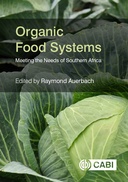Explore

Organic Food Systems: Meeting the Needs of Southern Africa
Raymond Auerbach
2020
0 Ungluers have
Faved this Work
Login to Fave
This book reports on long-term comparative organic farming systems' research trials carried out over the last 5 years in the Southern Cape of South Africa, as well as research into the successes and failures of the organic sector and the technical tools required for sustainable development in South Africa, Zambia, Uganda and Tanzania. It includes 24 chapters organized into 4 parts. Part 1 (Chapters 1-6) discusses the historical development of organic farming systems, examines the global issues which confront us, and develops some concepts showing a progression in small-scale farmer development and how this can be supported with appropriate training and policy. The difference between national food self-sufficiency and household food security is examined, and the organic sector is introduced. Part 2 (Chapters 7-14) deals with capacity building and climate change. Holistic systems, inclusive participatory approaches, institution building and experiential learning are examined. Organic food production, farmer training, value chains, impact of drought on food prices and food availability, and urban water and energy use efficiency are described. Part 3 (Chapters 15-22) presents evidence on how to support organic farmers. It starts with 2 case studies on the well-developed organic sector in Uganda and the developing one in Zambia. The following chapters discuss soil carbon determination, comparison of organic and conventional farming systems, pest and disease control (e.g., chemical, holistic and biological control), soil fumigation, soil microbiology in organic and conventional systems, soil fertility changes and crop yield. Part 4 (Chapters 23-24) makes strategic suggestions about how to upscale organic farming and organic food systems in Southern Africa. This book is a vital resource for all stakeholders in organic agriculture.
This book is included in DOAB.
Why read this book? Have your say.
You must be logged in to comment.
Rights Information
Are you the author or publisher of this work? If so, you can claim it as yours by registering as an Unglue.it rights holder.Downloads
This work has been downloaded 244 times via unglue.it ebook links.
- 59 - pdf (CC BY-NC-ND) at Unglue.it.
- 47 - pdf (CC BY-NC-ND) at Unglue.it.
- 76 - epub (CC BY-NC-ND) at Unglue.it.
- 62 - pdf (CC BY-NC-ND) at Unglue.it.
Keywords
- ACP Countries
- Africa
- Africa South of Sahara
- agricultural science
- Agricultural systems
- Agriculture & Farming
- Anglophone Africa
- Animals
- biocontrol
- capacity building
- Chordata
- climatic change
- Commonwealth of Nations
- Developing countries
- East Africa
- eco-agriculture
- ecological agriculture
- energy use
- energy utilization
- Eukaryotes
- Geographical Qualifiers
- Hominidae
- Homo
- integrated plant protection
- Least Developed Countries
- Mammals
- organic culture
- Organic farming
- organic foods
- pathogens
- pest control
- Pesticides
- Pests
- phytopathogens
- plant disease control
- Plant diseases
- plant pathogens
- plant pests
- Primates
- SADC Countries
- self sufficiency
- Soil
- Soil fertility
- soil flora
- soil fumigation
- South Africa
- southern Africa
- sub-Saharan Africa
- subsaharan Africa
- sustainability
- Tanganyika
- Tanzania
- Technology, engineering, agriculture
- thema EDItEUR::1 Place qualifiers::1H Africa::1HF Sub-Saharan Africa::1HFM Southern Africa
- Threshold Countries
- Training
- uganda
- value chain
- Vertebrates
- water supplies
- Water Supply
- Water use
- water use efficiency
- Zambia
Links
DOI: 10.1079/9781786399601.0000Editions

